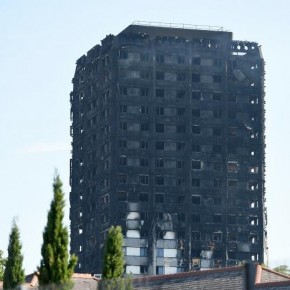
Industry calls for end to health and safety deregulation following Grenfell Tower fire
Over 70 leading organisations have penned an open letter to Prime Minister Theresa May urging the UK Government to scrap its approach to deregulation of health and safety legislation in light of the Grenfell Tower fire which left 79 people presumed dead.
The letter, signed by the Institution of Occupational Safety and Health (IOSH), Park Health & Safety, the Royal Society for the Prevention of Accidents (RoSPA) and the British Safety Council, also pushed for the Government to complete its review of Part B of the Building Regulations 2010.
The open letter, in full, reads:
“There have, understandably, been strong public reactions to the terrible fire at Grenfell Tower and its tragic consequences – the largest civilian loss of life from a single event in the UK since the Hillsborough disaster.
The occupational safety and health community is deeply saddened and disturbed by the Grenfell Tower fire and all the lives it claimed. We believe it is totally unacceptable for residents, members of the public and our emergency services to be exposed to this level of preventable risk in modern-day Britain.
Central Government and the Kensington and Chelsea local authority share responsibility for building standards and their enforcement locally, as well as for the funding and management of the maintenance of social housing. These responsibilities must be backed up with good, essential regulations.
However, for many years, Ministers and others with influence over them have called for, including in health and safety, regulations to be axed as a matter of principle. Arbitrary rules were imposed to establish deregulation of health and safety, such as a requirement to abolish two health and safety regulations (and more recently, three) for any new one adopted.
This mind-set has meant that, even when it was recommended and accepted that mandatory fitting of sprinklers would make homes or schools safer, this was rejected in favour of non-regulatory action. In practice, this approach favours inaction.
Good, well-evidenced and proportionate regulations in health and safety, based on full consultation, are developed and adopted because they save lives and protect people’s health and wellbeing. They are not “burdens on business” but provide essential protection for the public from identifiable risks.
At this crucial time of national reflection and sorrow, we urge all politicians to re-emphasise the need for effective health and safety regulation and competent fire risk management. These are fundamental to saving lives and sustaining our communities.
We believe it is vital that this disaster marks a turning point for improved fire safety awareness and wider appreciation that good health and safety is an investment, not a cost.
We call on the Government to accelerate and confirm the timeframe for completing its review of Part B of The Building Regulations 2010 and to include a focus on improved safety in the forthcoming Parliament.
Together, we offer our organisations’ support in undertaking the review – we all have valuable links to experts in this area who can advise on best regulatory outcomes. In the meantime, we welcome the Government’s commitment to act and to implement the interim findings of the forthcoming public inquiry.
You have it in your power to remove immediately a further risk to people at work and outside of the workplace – unwise deregulation – which threatens public and worker safety.
We, leaders in health and safety in the UK, call on you to scrap the Government’s approach to health and safety deregulation and think again. This could be announced immediately, it does not need to await the results of a public inquiry, and is the least that the victims of the Grenfell Tower fire deserve.”
Latest news

9th April 2025
Insight Data: Smart spending - how targeted marketing offsets rising costs
As ‘Awful April’ lands, fenestration businesses must use data-driven marketing to maximise impact, cut waste and stay ahead, says Alex Tremlett, Insight Data’s commercial director…
Posted in Articles, Building Industry News, Building Products & Structures, Building Services, Doors, Glass, Information Technology, news, Posts, Research & Materials Testing, Windows
9th April 2025
Saniflo: Retrofit 2025 at the Building Centre
Saniflo is delighted to announce a six-month collaboration with the Building Centre as a Principal Partner for ‘Retrofit 2025 – What’s Stopping Us’.
Posted in Articles, Bathrooms & Toilets, Bathrooms, Bedrooms & Washrooms, Building Industry Events, Building Industry News, Building Products & Structures, Building Services, Case Studies, Drainage, Exhibitions and Conferences, Facility Management & Building Services, Innovations & New Products, Interiors, Pipes & Fittings, Plumbing, Restoration & Refurbishment, Retrofit & Renovation
9th April 2025
FIT Show Launches Comprehensive CPD Learning Programme - Registration Now Open!
FIT Show, the UK’s leading trade event for the window, door, flat glass, hardware, components, and roofing industries, has unveiled its extensive learning programme for the 2025 event.
Posted in Architectural Ironmongery, Articles, Building Industry Events, Building Industry News, Building Products & Structures, Building Services, Building Systems, Continuing Professional Development (CPD's), Doors, Exhibitions and Conferences, Glass, Glazing, Innovations & New Products, Posts, Restoration & Refurbishment, Roofs, Seminars, Timber Buildings and Timber Products, Training, Windows
8th April 2025
First look at industry speakers for GEO Business 2025
GEO Business, the UK’s premier geospatial event, is set to return to ExCeL London on 4 – 5 June 2025, bringing together the brightest minds in the industry.
Posted in Articles, Building Industry Events, Building Industry News, Building Products & Structures, Building Services, Exhibitions and Conferences, Information Technology, Innovations & New Products, Restoration & Refurbishment, Retrofit & Renovation, Seminars
 Sign up:
Sign up: